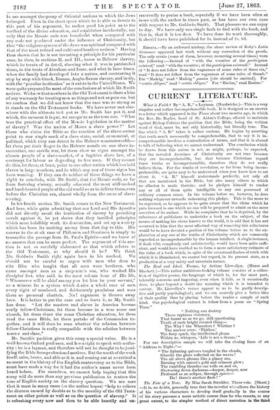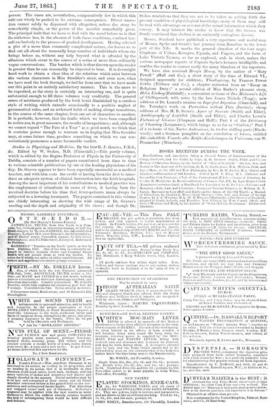The Fate of a Year. By Miss Sarah Stredder. Three
vols. (Skeet.) —It is, no doubt, generally true that the novelist who allows the history of his various characters to develop itself gradually in the course of his story pursues a more artistic cotirse than he who resorts, to any great extent, to the simpler method of direct narration in the third person. The cases are, nevertheless, comparatively few in which this rule can wisely be pushed to its extreme consequence. Direct narra- tion cannot safely be dispensed with altogether, unless the story be remarkably simple, or the power of the novelist remarkably great. The principal fault that we have to find with the novel before us is that its authoress has, in the absence of both these conditions, confined her- self exclusively to the process of gradual development. Having selected a plot of a more than commonly complicated nature, she leaves us to End out all about the unusually large number of individuals whom she brings before us, without any help beyond what is afforded by the allusions which occur in the course of a series of more than ordinarily vague conversations. The burden which is thus thrown upon the reader is greater than he can reasonably be expected to bear. It is downright hard work to obtain a clear idea of the relations which exist between the various characters in Miss Stredder's story, and even now, when we have read the book through, we feel far from sure that we have made out this point in an entirely satisfactory manner. This is the more to be regretted, as the story is certainly an interesting one, and is quite substantial enough to fill three volumes very creditably. The general sense of mistiness produced by the book is not diminished by a careless style of writing, which extends occasionally to a positive neglect of grammatical rules, and an awkward habit of making abrupt transitions, in the course of the same chapter, from one set of characters to another. It is probable, however, that the faults which we have been compelled to notice are, in great measure, the results of inexperience ; and, although we cannot regard "The Fate of a Year" as a good novel, we think that it contains power enough to warrant us in hoping that Miss Streclder may, at some future time, produce something on which we can con- scientiously pronounce a more favourable verdict.































 Previous page
Previous page